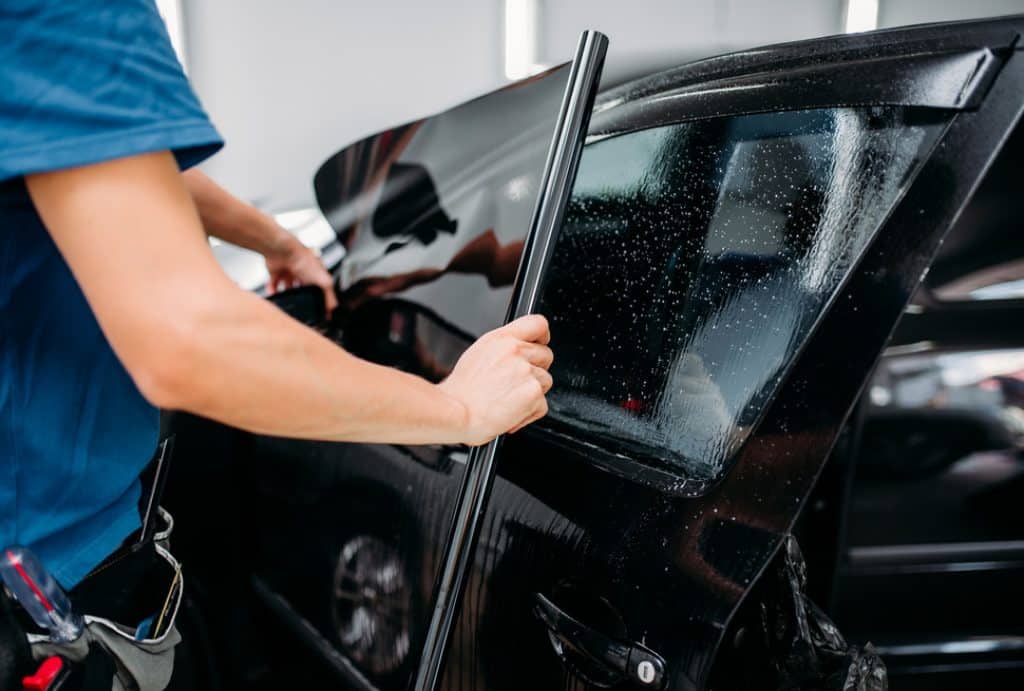Car Windows Are Different Than House Windows
Cleaning car windows effectively requires knowing what products to use and the different types of windows you may encounter.
Importance of Using Proper Cleaning Solutions
It’s crucial to select the right cleaning solutions for your car windows to prevent damage and ensure visibility.
Ammonia-based cleaners like many household glass cleaners should not be used on car windows, especially if they have tint. These solutions can degrade the window tint or cause streaking.
Instead, opt for automotive-specific glass cleaners that are safe for all types of car windows and provide a streak-free finish.
- Non-Ammonia Glass Cleaner: Safe for tinted and non-tinted windows.
- Ammonia-Based Cleaner: Harmful to tinted windows and interior materials.
Types of Car Windows and Coatings
Car windows come in different types, each with specific characteristics and coatings. The two primary types are tempered glass for side and rear windows, and laminated glass commonly used for windshields.
- Tempered Glass: Shatters into small, less harmful pieces in an accident.
- Laminated Glass: Consists of two pieces of glass with a plastic film in between, designed to stay intact on impact.
Additionally, various coatings may be present on car windows:
- Tinted Coatings: Applied for privacy or UV protection. Requires special care when cleaning.
- Clear Coatings: Often hydrophobic, aiding in water repellence.
Using Windex on Car Windows

Windex can be a suitable cleaner for automotive glass when used correctly. The following sections outline the type of Windex to use and a step-by-step cleaning process for your car windows.
Windex Formulations and Car Window Safety
Different formulas of Windex are available, and not all are suited for car windows.
The original Windex Glass Cleaner is generally safe for use on car windows. It contains a mixture of cleaning agents like ammonia-D, which cuts through grime and fingerprints without leaving streaks.
No Windex products should be used on window tints, as they may contain chemicals that can deteriorate the tint material.
- Safe for glass: Original Windex Glass Cleaner
- Unsafe for tinted windows: All Windex products
Step-by-Step Guide for Cleaning Car Windows with Windex
To clean your car windows with Windex, follow this straightforward procedure:
- Park in the Shade: Start by parking your car in a shaded area to prevent the Windex from drying too quickly, which can leave streaks.
- Remove Loose Dirt: Use a dry microfiber cloth to wipe away any surface dust or dirt from your windows.
- Spray Wisely: Lightly spray a small amount of Windex onto the glass. Avoid oversaturating the window.
- Wipe in a Pattern: Wipe the window using a microfiber cloth in a circular motion transitioning to vertical and horizontal strokes for a streak-free finish.
- Buff Dry: After you’ve covered the entire surface, use a fresh microfiber cloth to buff the glass dry.
- Roll Down Windows: Remember to roll down the windows slightly to clean the top edge where grime often accumulates.
- Location: Park in the shade
- Cleaning Cloths: Use microfiber for best results
- Spray Technique: Light application
- Wiping Technique: Circular, vertical, and horizontal motions
- Finish: Buff to a streak-free shine
Alternative Cleaning Methods and Products

When cleaning your car windows, numerous alternatives to Windex are available that can be just as effective. Here are some options:
- Vinegar Solution: Mix equal parts of water and white vinegar.
- This natural cleaner is good for removing dirt and residue.
- Alcohol and Water: A mixture of rubbing alcohol and water can break down grubby buildup.
- Soap and Water: A mild dish detergent and water solution can be used for regular cleaning.
DIY Cleaning Spray
- Ingredients:
- 2 cups distilled water
- 1/2 cup white vinegar or rubbing alcohol
- 1/4 cup dish detergent
- Directions: Mix ingredients in a spray bottle.
Using Newspapers: After spraying your cleaner of choice, use crumpled newspaper instead of a cloth to wipe the windows.
Newspapers don’t leave lint and can give a streak-free finish.
Microfiber Cloths: If newspapers aren’t your preference, consider using microfiber cloths.
They absorb water well and help prevent streaking.
Please be cautious with tinted windows. Harsh chemicals might damage the tint; always check the label of your chosen cleaner to ensure its compatibility with tinted glass.
| Material | Use Case | Effectiveness |
|---|---|---|
| Vinegar | General cleaning; residue removal | High |
| Alcohol | Tough grime and buildup | Medium to High |
| Dish Soap | Everyday dirt and smudges | Medium |
| Newspaper | Streak-free drying | High |
| Microfiber | Absorbent, streak-free cleaning | High |
Selecting the right product or method ensures that your car’s windows remain clean without causing any damage. Consider what works best for you, taking into account effectiveness and safety for your vehicle’s windows.




